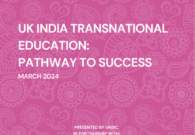Richard Heald, CEO’s June Newsletter
UK India Business Council CEO, Richard Heald, gives his take on the events of the last month, which began with a surprising result in the UK's 'snap' election

It is hard to ignore the political events of the last month in the UK.
Prime Minister Theresa May’s decision to call a snap election for June 8 certainly added a level of uncertainty into the political dynamics.
Three weeks on, and the result of a minority Conservative Government, supported by the Democratic Unionists has offered some level of continuity.
The Government’s position remains as was set out in the letter at the end of March triggering Brexit to the European Commission. Negotiations have commenced and this will be a running story over the next 24 months… most of which will be played out in the press, no doubt.
The focus on developing trade and investment remains a priority. The Government is to press ahead with its commitment to a ‘Global Britain’ by seeking closer collaboration with the world’s fastest growing economies – of which India is of course a major one.
Despite a temporary demonetisation related blip in GDP, India continues to march forward with its own reform agenda.
Typing this from a very wet Ahmedabad, Gujarat on 1st July, I have been watching the fanfare with which Goods and Sales Tax (GST) has just been officially rolled out across India (with the exception of Jammu and Kashmir) as from midnight last night. Finally the wheels on India’s largest ever tax reform have been set in motion.
It has been met with much enthusiasm by most of the population as well as the vast majority of business. There is political noise with opposition parties describing it as the “BJPs Tax Terrorism”. This sounds churlish and inaccurate bearing in mind the Ministry of Finance and the GST Commission has indicated that there will be flexibility in implementation in the early stages.
Of course, it is not a “simple tax” as we would know it with 5 slabs of tax depending on product and the amount of form filling in is complex – at least initially. The UK India Business Council has itself had to go through a steep learning process. We continue to offer support and via our members advice. Indeed, a recent UKIBC Facebook live event with our Chair and members discussion practical issues attracted some 140,000 views during the 42 minutes of screening.
Nonetheless, there is some level of residual concern among businesses on certain detailed issues. For instance, failure to address provisions around way bills or e-way bills is a concern. An e-way bill essentially underpins the GST, and enables the seamless movement of goods and services. If a company wants to move goods worth more than Rs 50,000 under GST, they must register the consignment and secure an e-way bill that tax officials could inspect at any time during the transit, in order to prevent tax evasion. This will pose a challenge in terms of the IT infrastructure for companies, as e-way bills must be generated in real time. In other words, unless a company has the IT system to support the generation of these bills in real time, they will encounter huge problems.
And it will provide the expected economic benefit, in time. Frankly, it is to be expected, there will be teething issues. Our conversations with senior Indian officials causes us to regard its introduction as an evolutionary process. Our view is that its introduction is a remarkable achievement for a country as complex as India. UK businesses should celebrate the implementation of GST in India, as the moment the country takes a very significant step towards a single market of goods and services. It is good for India, and it is good for UK businesses, which can now look at India as an even more attractive place to do business in.
On area where UKIBC expects GST to have a positive impact is in the Indian Textiles sector – one of India’s largest sectors in terms of employment and one of its most effective in terms of exporting. Yesterday, UKIBC sat on the platform with Prime Minister Modi, Minister Irani and Chief Minister of Andhra Pradesh at the inauguration of Textiles India 2017. India is giving much focus to the development of My speech focused on the commitment UK industry makes to the Indian textile sector, the positive expectations we have on the positives that will flow from FDI liberalisations and the introduction of GST and focusing on the benefits of collaborations that would flow from working together with UK research institutions in areas such as nano-engineered textiles. I will be meeting with Union Minister Irani this afternoon to exchange ways in which future proof sustainable employment might be created in the textile sector…. This is a key area where UKIBC believes the UK should and can engage.
This month has also seen a major strategy announcement with regard to the involvement of the private sector in defence procurement, with the recent announcement of the Strategic Partnership policy.
This is a significant initiative aimed at revitalising the ‘Defence Industrial Ecosystem’ and the announcement could well be ground-breaking. UKIBC’s views were set out in my article published recently in the Economic Times.
Cementing partnerships with Indian companies is already recognised as an important opportunity for big foreign defence manufacturing companies, providing an impetus to ‘Make in India’ – one of the key pillars of Prime Minister Modi’s reform agenda.
The British defence sector, with its unique expertise and established long-term commitment, is looking at these developments with attention, but as always, the devil will be in the detail.
It’s been over a decade since India’s private sector was directly involved in defence manufacturing, so this is a welcome step, that will ensure all stakeholders are brought together, including foreign original equipment manufacturers, for developing indigenous defence manufacturing.
Active involvement of the private sector will have a transformational impact. It will enhance competition, raise efficiencies, facilitate faster and more significant technology absorption, create a tiered industrial ecosystem, ensure development of a wider skill base, trigger innovation and promote participation in global value chains and exports.
As the British defence industry is widely recognised as one of the most innovative in the world, one can be confident that it will engage to assist in making this initiative a success.








